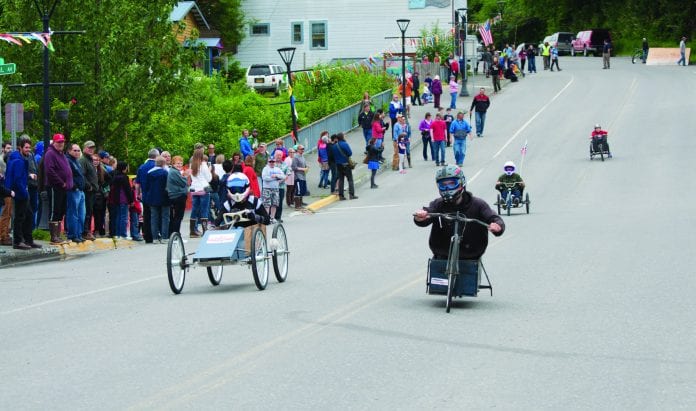
Another Fourth of July, Cordova Style, is here. Our fair city was incorporated on July 8, 1909, just four days after the first official celebration of Independence Day on Main Street.
Befitting a newly born railroad town, one of the big events was a drilling contest; and no, it was not a race to see which local dentist could repair a track layer’s tooth the fastest.
Rather, it pitted pairs of contestants to see who could sledgehammer a handed-held rod deep enough into rock to create a hole to insert sticks of dynamite, which was a common technique used in blasting troublesome rock out of the way while building the nearby Copper River and Northwestern Railway.

Cordova Historical Society photo
The drilling contest was held on Main Street right in front of the Alaskan Hotel and Bar, a landmark that still stands today. A crowd of men in dark suits and ladies in long skirts, all wearing formal hats, surrounded the contestants, with others peering down from the top of the hotel, which was only two stories tall that year. Business was so good at the famous watering hole that by the next Fourth a third floor had been added.
Gradually the center of Independence Day celebrations shifted up the street. President Warren G. Harding arrived in Cordova on July 20, 1923, and at that time a large bandstand had been built near the spot where today’s Kelp Box Races begin at the northern end of Main Street.

Cordova Historical Society photo
Harding was the first president to ever set foot in Alaska, and the only one that has ever graced Cordova’s main thoroughfare. His visit just happened to be two weeks after the Fourth. Even though it was during the Prohibition Era (1920-1933), Harding was known to secretly sip scotch on the golf course. One wonders if he popped into the Alaskan for a shot of Cordova’s finest.
Soon the celebration migrated to the center of Main Street, perhaps to be more conveniently located midway amidst the 13 pubs that lined the busy byway.
Parades and lively celebrations took place in front of a bandstand and judges’ platform built near the front of the Empress Theatre, now the location of Wells Fargo Bank. For a number of years, a boxing ring was also set up at that spot for outdoor bouts that were later held in the Bidarki Recreation Center gymnasium.

Cordova Historical Society photo
Huge crowds lined the street for the parade, which attracted kids of all ages for costume prizes and races, and also the traditional sawdust-pile scrum for coins buried within. Onlookers peered out the windows of the Elks Club, which was on the second floor above the Drug Store. The back part of that floor was a large hall that served as Cordova’s first basketball court, from 1922 to 1928.
Along with the copper that kept the local economy booming, there were bountiful razor clams near Whitshed and beyond that supported a major seafood industry, and famous Bob Korn provided free clam chowder for everyone after he strutted down Main Street leading the Fourth of July parade.

Cordova Historical Society photo
Korn came to Cordova in 1921, started the Imperial Taxi Company, and later was an owner of the Imperial Bar and then co-owner of the Alaskan. He was a huge benefactor of Cordova youth activities, and the Bob Korn Swimming Pool is named in his honor.
The modern era Kelp Box Derby harkens back to the ’80s when herring roe on kelp was packed and shipped out in special wooden boxes. It was created as a unique spinoff from Soap Box Derbies that were so popular throughout the country.
These days the Cordova Chamber of Commerce provides kelp boxes, the Cordova Police uses a radar gun to determine how fast the racers are going, and timers monitor when a wide variety of entries cross the finish line. Mesh barriers are erected in the high-speed areas near the base of the hill, as more than one out-of-control entrant has veered off course and plowed into the crowd or ended up vanishing at a frightening rate down the steep hill toward the Cordova Boat Harbor.
Cordova’s EMTs are standing by with an ambulance parked between the Legislative Information Office and the Prince William Sound Aquaculture offices to handle any injuries, as many of the souped-up boxes ride on fast turning bicycle wheels, with sometimes dubious braking and steering systems. Helmets are the hat-ware of choice these days.
Over 110 years, the 300-yard stretch of Main Street from the old Masonic Temple to the Alaskan Hotel and Bar has been the site of an amazing variety of Fourth of July celebrations.
As we take part in honoring the day in 1776 that our Independence from England was declared, Cordovans should take great pride in the special, unique ways that we have made this day so memorable.
And maybe stop by the Alaskan, raise a toast of President Harding’s finest, and glance out the window to visualize where it all started, now the site of today’s museum and Cordova Center.














